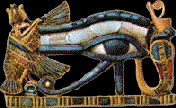When the conquering Napolean first saw the pyramids, he pulled on his horse's reins so hard he was thrown. All his companions ran away in awed fright. As he looked at these marvels of human engineering, do you think Napolean was thinking that aliens built these monuments? Course not, so why should we.

Let's give human ingenuity its due. Back in the Old Kingdom of Egypt, say 2667 BC to 2141 BC, a pharaoh imagined the first pyramid and in only 3 generations we already built great Giza. Over 100 pyramids were constructed and 80 still stand. The remnants of failed attempts lay all over the sands of Egypt. Abandoned projects, unfinished heiroglyphic stories, these still exist for us to learn from and admire. I want to look at what we've thought these to represent:


Whatever it was thought you'd become in the next life, you had to stand before Osiris and be judged by the weight of your heart. Then you could proceed. The engineering feats of these people went far beyond what was thought possible at the time. By 1500 BC to 700 BC much was done and much was lost, in a dark time Egypt went through caused by war. But in the New Kingdom pharoahs like Ramesses 11 built such things as only a great ego and uncontrolled imagination could produce. His wife, Neferteri, was exceptionally intelligent in the knowledge of the cosmos, physics, math, all the sciences, and of course, intricate languages. Now off the track to an interesting tidbit: We're not in the right year - here's why:
When going back from say, 900 BC to 1 BC, the time "before Christ" we come to the way time was counted in 1 AD, "anno dominae" or the year of Our Lord. But when we got to 1 BC, no one, for some reason, considered to include the "zero" year, or the time between 1 BC and 1 AD. As you know, a century has to pass before you call it one, which is why 2000 AD is in the 21st century. So when you count in BC time, 5, 4, 3, 2, 1...then start up in AD and it's 1, 2, 3, 4, 5 AD. There's no accounting for that in-between year of 0, between the two. Think of it this way: When we were on the brink of the new millenium, it was 1999. Then we went to 2000 but it was not the new millenium until one year had passed, or 2001. The year zero was accounted for in 2000 and when that year was over we started this millenium. This didn't happen when changing from BC to AD, so actually I think we lost a year.
That means I'm actually a year behind my life, I guess. Am I in the future? OMG this gives me an idea for another post....see you on the next page!

















































5 comments:
I'm getting too sleepy for a philosophical question like that! lol
Very interesting entry.
Lori
How cool! lol I am on my way to the next entry my starlady. Love Pam xx
Seeing the pyramids is one thing I would like to do before I leave this earth. They are so fascinating to me.
xx
Lisa
very interesting post I get the next one too
hugs
Sherry
I remember the arguments from the year 2000 about when the new century begins. No, I think you're right on time. What amazes me about time is this. The ancient Egyptians and the ancient Romans were able to create feats of architecture, engineering and other things that we take for granted today. But somewhere between now and then so much has been lost. Europeans of the Middle Ages were completely lost. Interesting.
Jude
http://journals.aol.com/jmorancoyle/MyWay
Post a Comment